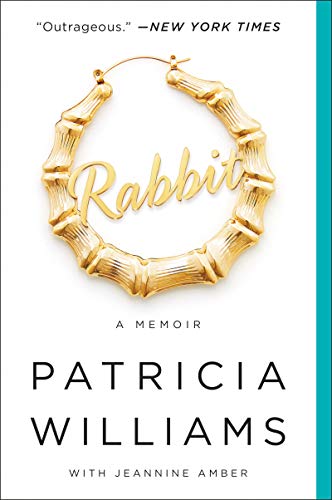 "Man," said Lamont, whistling through his teeth. "That's some deep-ass shit. Like multigenerational deep-ass shit."
"Man," said Lamont, whistling through his teeth. "That's some deep-ass shit. Like multigenerational deep-ass shit."Holy smokes. This book was A LOT. Patricia Williams aka Rabbit aka Ms. Pat is currently a comedian (appearing on, among other things, WTF with Marc Maron), so all of the reviews of Rabbit mention how funny it is. It is NOT funny. Williams grew up in Atlanta in abject poverty. As in she knows how long it takes for a birthday candle to burn all the way down because sometimes that's all they had to light their apartment poverty (seven minutes). As in she fed her three month old daughter chewed up ketchup sandwiches because she couldn't afford formula poverty (her daughter was the first person in her family to graduate from high school). Her life was unimaginably hard. She was continuously molested by a neighbor when she was a pre-teen while her mother looked the other way because he bought them groceries. The father of her first two children was 20 when he started dating her when she was 12. TWELVE! She had her first child when she was 13 and her second when she was 15. She sold crack, was shot, and served prison time. Eventually, Williams settled down with a stable partner, gave up her illegal occupations, and started doing comedy.
I read this book because I was hoping it would provide insight into a world and experience that I know nothing about. While Rabbit certainly exposed me to a totally different experience, I didn't find it that insightful because Williams doesn't do a lot of self-reflection. She writes about how crack destroyed the lives of friends and loved ones (and got her shot in the back), but aside from a couple of paragraphs she doesn't really explore her own role in profiting off of that misery. She transitioned from selling crack to forging checks that a friend stole from the post office, but spares no second thought about the impact of her theft on those victims. She also tells stories of unimaginable indifference or seemingly irrational behavior on her part and the part of those around her. In one scene, her mother, an alcoholic who authored a lot of Williams's misery in her formative years, refused to go with Williams to the hospital when she was in labor with her first child. In another, a social worker set up Williams with a spot at a summer camp and gave her mother vouchers to get everything Williams needed at K-Mart, but her mom just didn't go get the supplies. Later, after Williams and her partner have been raising her four nieces for ten years because her sister was addicted to crack, her sister barges in with a court order granting her custody again (at least two of the teen girls, including a 13 year old, were pregnant within a year). Williams doesn't spend much time analyzing or trying to explain this behavior. Let me be clear: I do not judge Williams for this omission and I don't really judge the people ravaged by addiction and poverty. I didn't experience any of that, so how can I know what it was like and what it does to you? But I would have appreciated more exploration of how these issues affect people, not just the end results.
What did stick out to me is how big a role dumb luck plays in how your life turns out. Williams made it, her sister didn't. For ten years, Williams raised her four kids and her sister's four kids in a happy, healthy, safe home, but then her sister took her daughters back. While Williams's kids were graduating from high school over the next few years, Williams was rescuing her 16 year old niece's four kids from a mother hooked on crack ("At Auntie Pat's, we get to eat every single day," her young nephew explained to his sister upon arrival at their new home). I was born a rich white man, Williams was born a poor black woman.
Overall I'd say Rabbit is worth reading, but know what you're getting into to.

No comments:
Post a Comment